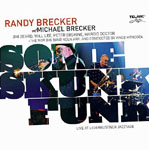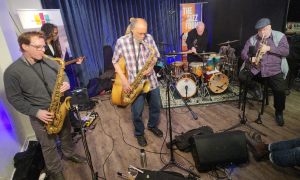Home » Jazz Articles » Live Review » Michael Brecker: Celebration of a Healer
Michael Brecker: Celebration of a Healer
The most treacherous position in jazz was being the guy who has to take a solo right after Mike Brecker.
—Pat Metheny
Town Hall
New York, NY
February 20, 2007
Town Hall was the scene for a spirited memorial service for Michael Brecker, universally acclaimed as one of the most influential jazz sax players since John Coltrane—and certainly among the most productive and ubiquitous: think of a name in innovative jazz or pop, and chances are Brecker's sax has been in the studio or on stage with them—from McCoy Tyner to Paul Simon, Herbie Hancock to Bruce Springsteen, from Elvin Jones to Joni Mitchell, Frank Sinatra to Steely Dan, from Joe Lovano to Donald Fagen, Dave Liebman to Dire Straits, or Pat Metheny to the Saturday Night Live Band... The list goes on and on, including the unlikely: he appears on Frank Zappa's live album Zappa in New York; and he's there in the James Brown's Celebrity Hot Tub Party parody, behind Eddie Murphy (during which he must have particularly enjoyed himself; as one fan told me, "he must have been busting a gut behind Eddie," since Michael had been part of the NY studio section that played on several James Brown records, including Brown's hit, "My Thang," in the 1970s). Early in his career, he was already playing with the likes of Horace Silver and Billy Cobham. And the verdict was nearly always the same—Brecker did not simply play backup or a secondary supporting role —he was, more often than not, a key part of the sound of some of the marquee artists' most successful endeavors, not to mention his own projects—many with his brother, trumpeter Randy Brecker. Never mind the multiple Grammy Awards (more than a dozen through his career, two of which were awarded just weeks after his death): Michael Brecker was, as they say, a force to be reckoned with.
If you're a jazz fan, you probably know already who Michael Brecker was, what he represented, and why he's gone now. A couple of years ago, Brecker contracted the extremely rare blood disorder, myelodysplastic syndrome (MDS)—so rare that it's found virtually nowhere outside the Ashkenazi (Eastern/Central European) Jewish community and their descendants (and even then, it's extremely rare). What might have saved his life would have been a stem cell donation from a compatible donor—but in spite of an ambitious and aggressive worldwide search, no matching donor could be found. Word went out through just about any major Jewish organization you can name (and many non-Jewish ones). E-mailed pleas by the dozens flew to and from music fans, synagogue congregations, and known and potential Ashkenazi Jewish donors, calling on them to get their blood tested at any of the many testing centers set up around the country to find donor material. None were found. Doctors did try an experimental partial-match stem cell transplant, which gave him some relief from his symptoms, but they were ultimately not able to save him. He passed away on January 13 of complications from leukemia, a result of the MDS. Five weeks later, colleagues, fans, bandmates, the greater musical community, family members, and many others gathered—a crowd estimated anywhere from 2000 to 3000—at New York's Town Hall to celebrate the life of Michael Brecker, tenor giant.
There were eulogies and stories from the people who knew him best—including his 13-year-old son, Sam ("He'd stick his tongue out at me, do a funny dance... It made me so happy because it reminded me of my old daddy before he got sick"), wife Susan and brother Randy, Herbie Hancock, Pat Metheny, Dave Liebman, and others (including a video sent in by James Taylor, testifying to how Brecker helped Taylor—and others like him—kick his drug habit some 20 years ago). In the audience, among the fans and friends were such figures as Joe Lovano, Wayne Shorter, Buster Williams, and David Sanborn (who has been fighting his own battle against post-polio syndrome).
And there was the music. Of course. Randy and his brother's rhythm section (Joey Calderazzo on piano, James Genus on bass, and Jeff "Tain" Watts on drums) delivered Calderazzo's "Midnight Voyage" (from Michael's CD, Tales of the Hudson). Liebman, on a small wooden flute (Susan Brecker asked that no saxophones be played), performed Brecker's Asian-tinged "A Gathering of Spirits," and Metheny soloed on acoustic guitar with a piece he'd written for Brecker, "Every Day (I Thank You)."
Hancock joined bassist John Patitucci and drummer Jack DeJohnette for his own wonderfully haunting "Chan's Song" (originally from the 1986 movie, Round Midnight, which starred another tenor giant, Dexter Gordon), which he had recorded on Brecker's Nearness of You: The Ballad Book. And in what was called by one audience member "one of the most poetic moments" of the evening, Hancock joined Paul Simon on "Still Crazy After All These Years," which originally featured Brecker on a solo that meshed jazz and pop so well that saxophone players study it to this day. Simon recounted how in the 30 years since then, he has sung the song "a million times," and every time he can tell the saxophonist on the gig is intimidated by Brecker's solo. They would all start their solo imitating Brecker, until they played a few bars and got it out of their system, at which point, Simon said, "they are free."
A video encapsulated the story of Michael's life—from childhood to the 1960s and 1970s, and including clips of recent bands, where he played innovative, complex compositions in what's been described as a "post-Coltrane" style; the film also showed samples of fusion and funk work in the 1970s, as well as his time as sideman to the likes of Joni Mitchell and Paul Simon.
Randy recounted how he and his brother always had a little rivalry in music, and he told about a recording gig with a "crazy Hungarian producer" who wanted them to dub over music already recorded. The producer sent them the sheet music ahead of time, and Randy said the shit was extremely difficult and he had to really practice to get it right. Michael arrived at the studio direct from the airport after a world tour, and hadn't had a chance to practice for the session at all. The producer told Michael to take the first solo and sent everybody else to the control room. As Randy passed Michael, he made some smart-ass comments, telling his brother to "concentrate," and laughed. The producer asked Michael to begin his solo soft, with a low intensity, and then build on it. Randy and the others, including guitarist Mike Stern, listened from the control room as Michael played an unrehearsed solo—reaching a height of passion that has been called "of disturbingly high quality," and which lasted a full 11 minutes. The producer then turned to Randy and said "Ok, you take it from here." Randy said he just stared at the producer—and at Stern, who by then had collapsed onto a couch in wild laughter. All Randy could say was, "Take it from here to where?"
Randy also spoke of his brother's impact on jazz in relation to that of John Coltrane: "I remember when Trane died and thinking, 'What are we going to do?'" And then he added, "That feeling is once again upon us."
Put Randy's story together with the effect of Brecker's "Still Crazy"" solo on subsequent sax players, and you'll understand why Pat Metheny said, "The most treacherous position in jazz was being the guy on the bandstand who has to take a solo right after Mike Brecker."
One speaker after another testified to his generous spirit, and how even at his lowest points as the disease ran its 2-1/2 year course, he was always more concerned with others than with himself. Opening the ceremony, Darryl Pitt, Michael's manager, said that "Mike's sense of humility, in light of his accomplishments, was matchless."
When Hancock spoke, he told of how Brecker tried to make people aware of blood testing to treat diseases such as leukemia and lymphoma, working through the Marrow Foundation. He said that "Mike saw his condition as something he could use to help others. If that's not compassion, I don't know what compassion is." He also noted that Brecker never said, "This will help me." It was always about helping others. In fact, one of Hancock's drummers—an Ashkenazi Jew—tried to donate blood for Michael, and although it wasn't a match for Brecker, apparently it worked for somebody else; Herbie made the point that Michael's activities were saving lives, even if he couldn't save his own. In a similar vein, Randy announced that as a result of the unsuccessful campaign to find a compatible donor for Michael, Israel now takes blood samples from all members of its armed forces.
Dave Liebman noted how, in spite of Brecker's achievements in jazz, he could easily slide from jazz to working with pop stars, something Liebman admits he has always been opposed to in his own work. Brecker, he said, "didn't have any problem playing pop... ," and that he did so "without any shame or guilt."
Ultimately, Liebman may have summed it all up when he spoke about their common Jewish background: "There was an unspoken agreement that we should do something good for humanity, he said. "Our families both were into the idea of making the world better, and Mike wound up doing that." ( "Making the world better"—or tikkun olam—is a traditional Jewish tenet, which many Jews believe is our primary purpose in life. No existentialist "Why are we here?" cries of anguish allowed!). Similarly, he mentioned Coltrane as a model they held in common, and who he paraphrased as saying "music could do good; it was more than just music."
Michael Brecker, by all accounts, achieved his purpose. He left the world a better place—with his spirit, with his life, and—in the truest sense of "healer"—with his music.
NOTE: The Brecker family has asked that donations be made to the Marrow Foundation.
I could not have written this article without help and inspiration from many people, including attendees at the Memorial, as well as readers who written to add illuminating details or correct some error. Special thanks to Eric P. who—as he has so often done—provided the initial spark and motivation.
Tags
PREVIOUS / NEXT
Support All About Jazz
 All About Jazz has been a pillar of jazz since 1995, championing it as an art form and, more importantly, supporting the musicians who make it. Our enduring commitment has made "AAJ" one of the most culturally important websites of its kind, read by hundreds of thousands of fans, musicians and industry figures every month.
All About Jazz has been a pillar of jazz since 1995, championing it as an art form and, more importantly, supporting the musicians who make it. Our enduring commitment has made "AAJ" one of the most culturally important websites of its kind, read by hundreds of thousands of fans, musicians and industry figures every month.

























